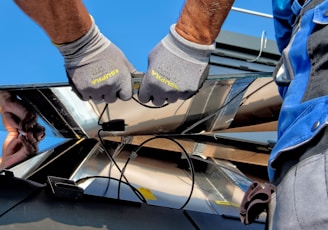Solar Maintenance and Repair
Identifying and Resolving Solar Panel Efficiency Issues


Identifying and resolving solar panel efficiency issues is a critical aspect of maintaining the optimal performance of solar energy systems. Solar panels are designed to capture sunlight and convert it into electricity, making them a sustainable and environmentally friendly source of power. However, various factors can lead to a decline in their efficiency over time.
One of the primary challenges in this regard is the accumulation of dirt, dust, and debris on the surface of solar panels. This layer of grime can block sunlight from reaching the photovoltaic cells, reducing energy production. Regular cleaning and maintenance are essential to prevent this issue. Additionally, extreme weather conditions and environmental factors such as bird droppings or tree shading can impact panel efficiency.
Another common concern is the degradation of photovoltaic cells themselves. Over the years, exposure to sunlight can cause wear and tear on the cells, leading to a decrease in their ability to convert sunlight into electricity. Manufacturers typically provide warranties for solar panels, but identifying cell degradation and addressing it promptly can extend the lifespan of the panels.
Inverter issues can also affect solar panel efficiency. Inverters convert the direct current (DC) generated by solar panels into alternating current (AC) for use in homes or businesses. Malfunctions in the inverter can disrupt the energy conversion process, leading to power losses.
To address these efficiency issues, regular inspection and maintenance are essential. Professionals can assess panel cleanliness, inspect for damage, and monitor inverter performance. In some cases, upgrading to more advanced and efficient solar panel technology may be advisable.
Solar inverter maintenance and troubleshooting are critical aspects of maintaining a reliable and efficient solar power system. Solar inverters play a pivotal role in converting the direct current (DC) electricity generated by solar panels into alternating current (AC) electricity usable in homes and businesses. To ensure the longevity and optimal performance of your solar inverter, regular maintenance and effective troubleshooting are essential.
Maintenance involves a series of routine checks and inspections. It includes cleaning the inverter's exterior to prevent dust accumulation, inspecting cables and connections for wear or damage, and ensuring proper ventilation to prevent overheating. Monitoring software can help track the inverter's performance, providing insights into any deviations from expected efficiency.
Troubleshooting comes into play when issues arise. Common problems include voltage fluctuations, grid connectivity issues, or error codes displayed on the inverter's screen. Troubleshooting involves identifying the root cause of these problems, which may require the expertise of a trained technician. This can involve checking the wiring, assessing environmental factors like shading or debris, or assessing the inverter's internal components.


Solar Inverter Maintenance and Troubleshooting
Preventing and Fixing Solar Panel Corrosion and Degradation
Solar panels are a sustainable and efficient source of clean energy, but like any technology, they are susceptible to wear and tear over time. One of the primary challenges that solar panel owners face is corrosion and degradation, which can significantly reduce the panels' effectiveness and lifespan. Preventing and fixing solar panel corrosion and degradation is crucial for maintaining their performance and ensuring a reliable source of renewable energy.
Corrosion typically occurs when the metal components within solar panels, such as aluminum frames and conductive materials, come into contact with moisture and oxygen. Over time, this chemical reaction can lead to rust and deterioration, compromising the panel's structural integrity and electrical connections. To prevent corrosion, regular maintenance and protective coatings can be applied to shield vulnerable components from environmental elements.
Degradation, on the other hand, refers to the gradual reduction in a solar panel's efficiency and power output over time. This can be caused by various factors, including exposure to extreme temperatures, UV radiation, and microcracks in the photovoltaic cells. To address degradation, monitoring systems can be installed to detect and address issues early, and replacing damaged or inefficient components can help restore a panel's performance.
Preventative measures and timely maintenance are essential to ensuring the longevity and reliability of solar panels. This not only safeguards the financial investment made in solar energy systems but also contributes to a cleaner and more sustainable energy future. Properly maintained solar panels can continue to harness the power of the sun for decades, reducing greenhouse gas emissions and dependence on fossil fuels while promoting a greener and more sustainable planet.




